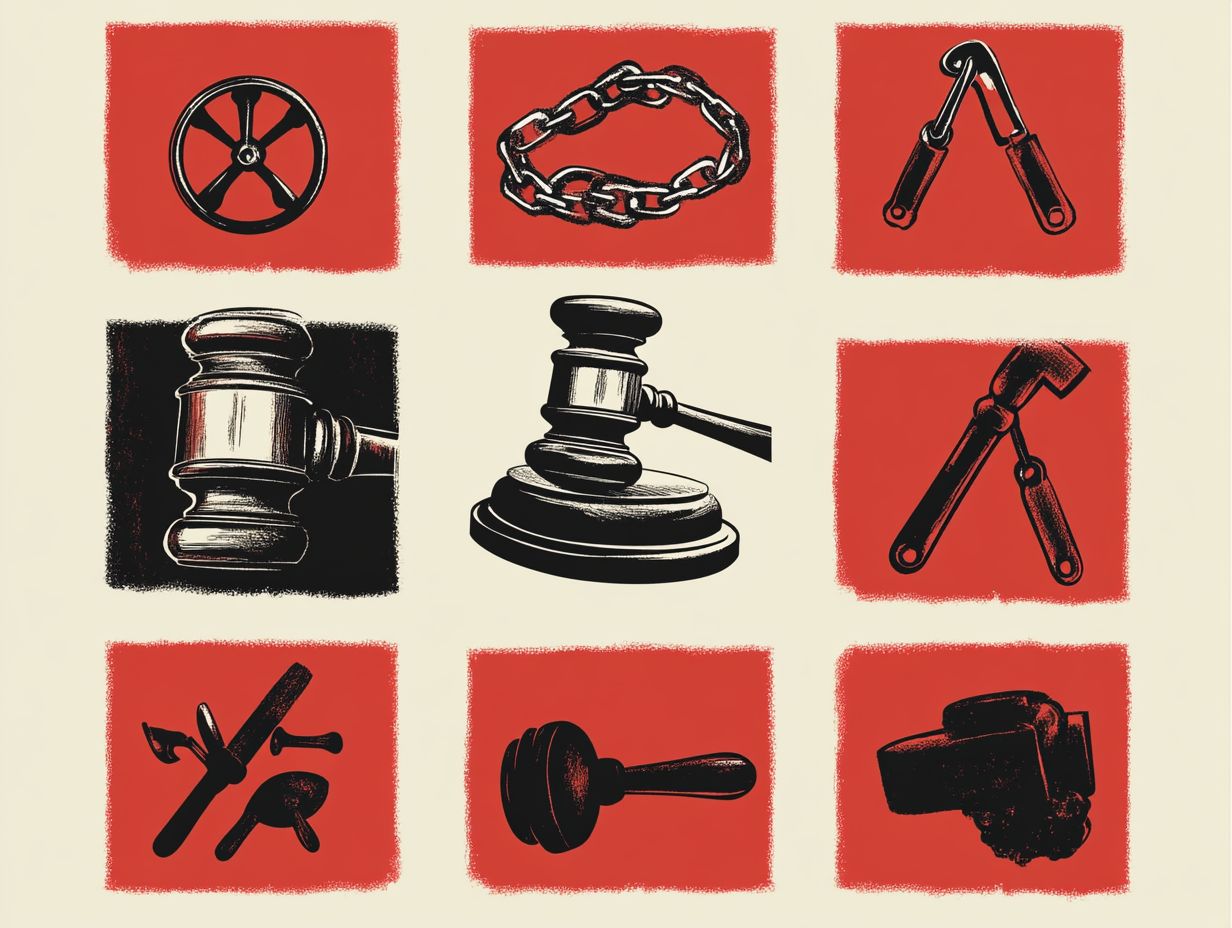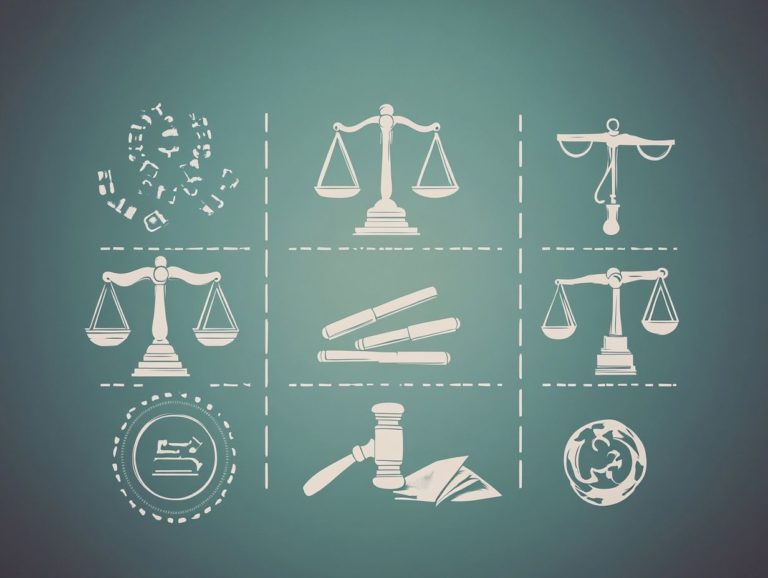7 Types of Assault Charges You Should Know
Understanding assault charges is critical to protect your rights and future. Let s dive into the seven key types of assault charges and what they mean for you!
Assault charges can carry significant consequences, making it essential for you to understand the various types as you navigate these complex legal waters.
From simple assault to more serious offenses like assault with intent to kill, each type presents its own unique set of penalties and potential defenses. This article will guide you through seven key types of assault, unpacking their implications and illustrating how effective legal representation can make a substantial difference in your situation.
You ll also discover practical steps to avoid such charges and what actions to take if you find yourself facing accusations. Empower yourself with the essential knowledge needed on this critical topic.
Contents
Key Takeaways:

Assault charges can range from simple assault to aggravated assault, sexual assault, and more.
Each type of assault charge carries different penalties and consequences, including fines and imprisonment.
Possible defenses for assault charges include self-defense, lack of intent, and mistaken identity.
1. Simple Assault
Simple assault, as outlined in the Texas Penal Code, includes different actions that can involve physical contact. Depending on the severity and circumstances such as bodily injury or underlying intent you may face Class C or Class A Misdemeanor charges.
A Class C Misdemeanor typically involves minor assault situations, often resulting in fines without the threat of jail time. A Class A Misdemeanor applies when there s actual bodily injury or the use of threats.
The penalties for these offenses can vary significantly. You might face a fine of up to $500 for a Class C charge, whereas a Class A charge could land you in jail for up to a year.
While simple assault is less severe than aggravated assault which involves a weapon or serious injury and is classified as a felony it still carries considerable consequences. It’s vital for victims to recognize their rights in these situations, including the ability to pursue protective orders or seek restitution, underscoring the importance of understanding these legal distinctions.
2. Aggravated Assault
Aggravated assault is a more serious legal classification than simple assault, distinguished by the use of a deadly weapon or causing serious injury. Depending on the specifics of your case, this can lead to charges that range from a 2nd-degree felony to a 1st-degree felony.
Several factors can make the charges more severe, including the victim’s age, any prior convictions you may have, or if the assault occurred alongside other crimes. If your altercation involves a firearm or results in significant injuries, it’s highly likely that it will be classified as aggravated assault.
The penalties for such offenses can be quite severe, often resulting in lengthy prison sentences and substantial fines.
Having a knowledgeable criminal defense attorney is crucial. They can expertly navigate these complex charges, advocating for reduced penalties or alternative sentencing options, either through negotiations or by challenging the evidence presented against you.
3. Sexual Assault
Sexual assault is a serious offense that goes beyond merely violating physical autonomy; it inflicts deep emotional trauma on victims and falls under felony assault laws designed to prioritize public safety and the rights of those harmed.
This disturbing violation can take many forms, from unwanted touching and coercion to penetration, each bringing with it a web of complex legal and moral questions.
Different jurisdictions may define these acts in unique ways, often establishing clear consent criteria that highlight the necessity of mutual agreement. This means both people must agree to engage in sexual activity.
Victims frequently grapple with enduring psychological scars, including anxiety, depression, and post-traumatic stress disorder, all of which can significantly diminish their quality of life.
The legal consequences for perpetrators can be severe, encompassing lengthy prison sentences, while victims may pursue protective orders to ensure their safety. This reflects a justice system committed to addressing these egregious acts and supporting those affected.
4. Assault with a Deadly Weapon
Assault with a deadly weapon is a serious classification of assault. It involves using a weapon or an object that could inflict significant bodily harm. This often results in criminal liability and charges that can range from a 3rd-degree felony to more severe penalties, depending on the specifics of the case.
This charge is different from other assaults because of the heightened threat it poses to public safety. Unlike simple assault, which might involve mere threats or minor physical harm, assault with a deadly weapon shows a clear intent to cause serious injury, increasing the responsibility of the accused.
Legal defenses for these charges can be complex, typically revolving around claims of self-defense or a lack of intent. This highlights the importance of having skilled attorney representation. An experienced lawyer is essential, as they can navigate the complexities of the legal system, ensuring that your rights are protected while formulating a strong defense against potentially severe penalties.
5. Domestic Assault

Domestic assault is a significant issue that often brings emotional scars and cycles of violence. It involves physical harm or threats directed toward a partner or family member, leading to unique legal challenges, including the potential for protective orders.
This term covers various behaviors that can impact individuals and families, highlighting a need for understanding and intervention.
As a victim, you may deal with physical injuries and emotional trauma that can affect your family dynamics. Thankfully, there are legal protections available, such as restraining orders and advocacy services, aimed at supporting those affected.
Law enforcement plays a crucial role in responding to allegations, ensuring that your rights as a victim are upheld. Seeking legal guidance is essential; it helps both parties understand their rights and responsibilities, allowing for informed decisions during these emotionally charged situations.
6. Assault on a Police Officer
Assaulting a police officer is taken very seriously within the legal system due to the officers roles as public servants. This often leads to enhanced penalties and unique legal consequences that distinguish it from other assault charges.
This type of assault is defined as any intentional attempt or threat to inflict bodily harm on an officer or causing actual physical injury. This can range from something as minor as a slap to the use of a weapon. Depending on where the incident occurs, the penalties can be quite severe, often escalating to felony charges that carry substantial prison sentences and hefty fines.
If you face such accusations, recognizing the importance of securing effective legal representation is crucial. A skilled attorney can navigate the complexities of the law and devise strong defense strategies. This level of representation can significantly alter the outcome of your case.
7. Assault with Intent to Kill
Assault with intent to kill ranks among the most serious assault charges, classified as felony assault, which carries heavy penalties. The prosecution must prove a deliberate intention to cause harm or death to another individual, a task that isn t straightforward.
This intent can be shown through various forms of evidence, including witness testimonies, forensic analysis, and any previous behavior suggesting violent intent. However, the legal definition of assault with intent to kill can differ across jurisdictions, adding complexity to the prosecution’s challenge.
If you find yourself facing such severe charges, you may have several defenses available self-defense, lack of intent, or mental incapacity, to name a few. Enlisting the expertise of a seasoned attorney is essential. They can help you navigate these intricate legal waters, ensuring that your rights are safeguarded while effectively challenging the prosecution’s case.
What Are the Different Types of Assault Charges?
Understanding the various types of assault charges is crucial as you navigate the complexities of criminal law. These charges span a wide range from simple assault to aggravated assault (a more serious form of assault), sexual assault, and vehicular assault. Each type has its own distinct legal definitions and potential penalties.
Grasping the nuances of these charges is vital not only for defendants but also for victims and the broader community. For example, simple assault often involves the threat of harm or actual physical contact without serious injury.
In contrast, aggravated assault typically includes a weapon or the intent to inflict serious injury, carrying much heavier penalties. Sexual assault charges revolve around non-consensual sexual acts, underscoring the profound impact these offenses have on victims lives.
Meanwhile, vehicular assault refers to instances where a driver intentionally or recklessly causes injury to another while behind the wheel. The severity of these charges significantly influences legal proceedings, shaping plea deals, sentencing outcomes, and the long-term ramifications for everyone involved.
What Are the Penalties for Each Type of Assault Charge?
The penalties for assault charges can vary dramatically depending on the type and severity of the charge. Outcomes may range from fines and probation for misdemeanor offenses to lengthy prison sentences for felony convictions.
For example, a simple assault, often deemed a misdemeanor, could lead to a fine of up to $1,000 and possibly a year of probation. On the other hand, aggravated assault typically classified as a felony, can come with penalties exceeding five years of imprisonment, influenced by the jurisdiction and specific circumstances of the case.
If you find yourself facing felony charges, be aware that restitution requirements may apply, meaning you could be responsible for compensating victims for their medical expenses or lost wages.
In domestic violence cases, protective orders may be issued, limiting your contact with the victim and serving as an essential measure to ensure their safety.
What Are the Possible Defenses for Assault Charges?

In assault cases, you have several viable defenses at your disposal, including self-defense, defense of others, and lack of intent. Having a competent criminal defense attorney by your side is essential for effectively navigating these legal avenues.
You might assert that your actions were driven by necessity, whether to protect yourself or someone else, highlighting the critical role that context plays in each situation.
Alternatively, you could argue that there was no malicious intent behind your actions, implying that any harm caused was purely unintended. Factors such as provocation, mental incapacity, or even mistaken identity can also be pivotal.
The specifics of the incident, including eyewitness testimonies and police reports, combined with the skillful representation of an experienced attorney, can significantly influence how the jury perceives the case and ultimately affect its outcome.
How Can a Lawyer Help with Assault Charges?
A skilled lawyer can significantly influence your defense against assault charges. They offer strategic guidance, ensure you have proper legal representation, and deftly navigate the complexities of the criminal justice system to secure the best possible outcome for you.
They begin by meticulously gathering evidence think witness testimonies, video footage, and police reports to build a robust foundation for your defense. Next, they delve into the circumstances surrounding the incident, hunting for inconsistencies and misunderstandings that could tilt the scales in your favor.
A proficient lawyer will craft customized defense strategies that highlight the specifics of your case, whether it s self-defense, lack of intent, or mistaken identity. Throughout the courtroom proceedings, their expertise shines as they articulate arguments persuasively, challenge the prosecution s claims, and ensure your rights are upheld at every turn.
What Are the Long-Term Consequences of an Assault Conviction?
An assault conviction carries significant long-term consequences. It impacts the immediate parties involved and casts a long shadow over emotional well-being, legal consequences, and personal lives.
Such a conviction can severely hinder your career advancement opportunities. Many employers conduct background checks and may hesitate to hire someone with a criminal record. The social stigma surrounding an assault charge often leads to isolation, creating rifts in relationships and making it challenging to forge new connections.
For victims, this can manifest as ongoing anxiety or post-traumatic stress. Those accused may grapple with feelings of guilt and rejection from society. The road to recovery for both parties is intricate and nuanced, highlighting the profound and often overlooked aftershocks of such incidents in their lives.
How Can One Avoid Assault Charges?
To avoid assault charges, understand your personal rights and recognize potential triggers for violence. Seek legal guidance to handle tough situations that could lead to conflict.
Effective communication becomes your best ally in de-escalating potential confrontations. Ensure that everyone involved feels heard and respected.
Investing time in honing your conflict-resolution skills can significantly reduce misunderstandings and contribute to a more peaceful environment.
Being aware of your surroundings and the emotional states of those you interact with is crucial. Recognizing signs of rising tension can help you prevent explosive situations.
Knowing when to seek legal advice is imperative, especially when conflicts seem to spiral out of control. This helps mitigate risks, protects your rights, and enhances overall public safety.
What Are the Steps to Take If Accused of Assault?
If you’re accused of assault, act quickly! Securing attorney representation is crucial to safeguarding your rights. This begins with gathering evidence and understanding the legal proceedings you ll encounter in court.
Your initial response is vital for developing a strong defense. Start by reaching out to a seasoned criminal defense attorney who can provide the expertise necessary to navigate the complexities of the legal system.
Next, document every detail related to the incident. Witness statements, photographs of the scene, and any relevant communications can significantly bolster your case.
It s also essential to familiarize yourself with courtroom procedures. This knowledge will help you know what to expect during hearings and trials. By taking these actions, you not only fortify your defense but also ensure that you’re proactively seeking justice.
Frequently Asked Questions

What are the 7 types of assault charges you should know?
The 7 types of assault charges include simple assault, aggravated assault, sexual assault, domestic assault, assault with a deadly weapon, assault on a police officer, and assault with intent to cause harm.
How is simple assault defined?
Simple assault is the act of intentionally causing harm or fear of harm to another person, either through physical violence or threats of violence. It is usually considered a misdemeanor offense.
What is aggravated assault?
Aggravated assault is a more serious form of assault that involves the use of a deadly weapon or causes serious bodily injury (harm) to the victim. It is considered a felony offense and can result in harsher penalties.
What is sexual assault?
Sexual assault is any type of unwanted sexual contact or behavior, including rape and other forms of sexual violence. It is a serious crime that can result in severe legal consequences.
Can domestic violence be classified as assault?
Yes, domestic violence, which includes physical, emotional, and sexual abuse within a domestic relationship, can be classified as assault. This type of assault charge can have its own set of penalties and legal consequences.
What is assault with intent to cause harm?
Assault with intent to cause harm is when a person intentionally causes harm or fear of harm to another person, with the specific intent to cause serious injury or death. This type of assault charge is usually considered a felony offense.






